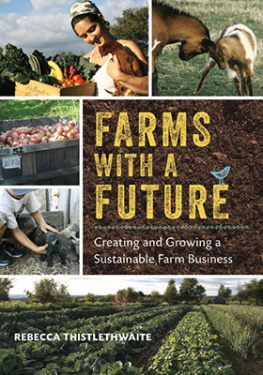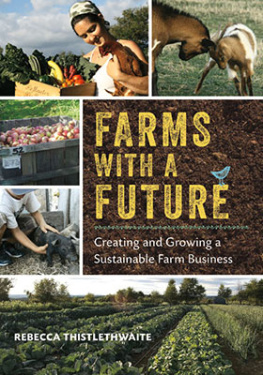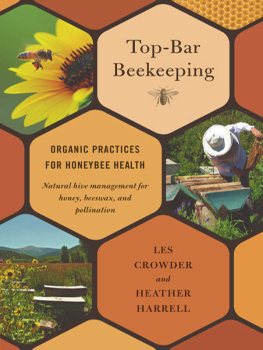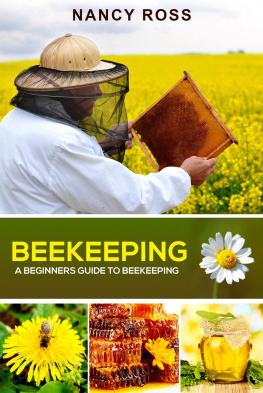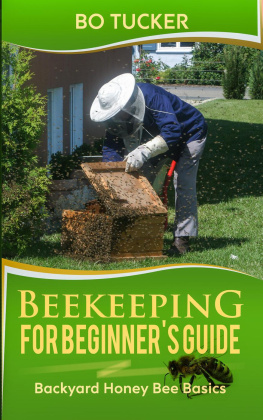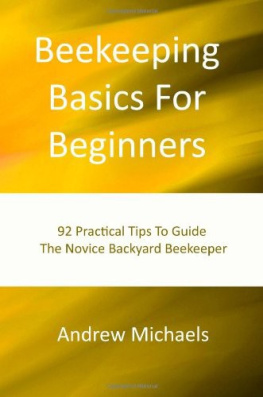Ross Conrad - Natural Beekeeping: Organic Approaches to Modern Apiculture
Here you can read online Ross Conrad - Natural Beekeeping: Organic Approaches to Modern Apiculture full text of the book (entire story) in english for free. Download pdf and epub, get meaning, cover and reviews about this ebook. year: 2013, publisher: Chelsea Green Publishing Company, genre: Romance novel. Description of the work, (preface) as well as reviews are available. Best literature library LitArk.com created for fans of good reading and offers a wide selection of genres:
Romance novel
Science fiction
Adventure
Detective
Science
History
Home and family
Prose
Art
Politics
Computer
Non-fiction
Religion
Business
Children
Humor
Choose a favorite category and find really read worthwhile books. Enjoy immersion in the world of imagination, feel the emotions of the characters or learn something new for yourself, make an fascinating discovery.
- Book:Natural Beekeeping: Organic Approaches to Modern Apiculture
- Author:
- Publisher:Chelsea Green Publishing Company
- Genre:
- Year:2013
- Rating:3 / 5
- Favourites:Add to favourites
- Your mark:
- 60
- 1
- 2
- 3
- 4
- 5
Natural Beekeeping: Organic Approaches to Modern Apiculture: summary, description and annotation
We offer to read an annotation, description, summary or preface (depends on what the author of the book "Natural Beekeeping: Organic Approaches to Modern Apiculture" wrote himself). If you haven't found the necessary information about the book — write in the comments, we will try to find it.
Ross Conrad: author's other books
Who wrote Natural Beekeeping: Organic Approaches to Modern Apiculture? Find out the surname, the name of the author of the book and a list of all author's works by series.
Natural Beekeeping: Organic Approaches to Modern Apiculture — read online for free the complete book (whole text) full work
Below is the text of the book, divided by pages. System saving the place of the last page read, allows you to conveniently read the book "Natural Beekeeping: Organic Approaches to Modern Apiculture" online for free, without having to search again every time where you left off. Put a bookmark, and you can go to the page where you finished reading at any time.
Font size:
Interval:
Bookmark:
"Natural Beekeeping is a wonderful book, beautifully written and illustrated, about how one can have healthy hives of bees without using synthetic pesticides, antibiotics, or artificial diets. Ross Conrad explains in fine detail that the key ingredients of organic beekeeping are disease-resistant stock, favorable apiary sites, and good colony management, plus a reverence and respect for the bees."
Thomas D. Seeley, Cornell University,
author of Honeybee Democracy and The Wisdom of the Hive
"Ross Conrad keeps bees the way bees should be kept. His natural approach to caring for these magnificent pollinators makes sure they will continue their tasks so we can continue to rely on them. Natural beekeeping is not only the best way to keep bees, it is the only way we should keep bees."
Kim Flottum, editor of Bee Culture: The Magazine of
American Beekeeping and author of The Backyard Beekeeper
"Ross Conrad buzzes and brainstorms where other angels have feared to tread. He makes organic apiculture seem not only possible, but necessary."
From the Foreword by Gary Paul Nabhan
"Ross Conrad has created an intimate guide to beekeeping that clearly details holistic methods aimed at hive health. The honeybee faces many affronts to its immune system, [making] it all the more imperative that local farmers and gardeners learn ways to assist the honeybee. Ross has laid out the ground rules; the rest of us need to heed the buzz."
Michael Phillips, author of The Holistic Orchard and The Apple Grower
"Natural Beekeeping describes opportunities for the seasoned professional to modify existing operations, increase profits, and eliminate the use of chemical treatments. Beginners will need no other book to guide them. Whether you are an experienced apiculturist looking for ideas to develop an integrated pest-management approach or someone who wants to sell honey at a premium price, this is the book you've been waiting for."
Pest Inspections blog

Copyright 2007, 2013 by Ross Conrad.
All rights reserved.
Unless otherwise noted, all photographs copyright 2013
by Ross Conrad.
No part of this book may be transmitted or reproduced in any form by any means without permission in writing from the publisher.
Project Manager: Patricia Stone
Project Editor: Benjamin Watson
Copy Editor: Fern Marshall Bradley
Proofreader: Eric Raetz
Indexer: Lee Lawton
Designer: Melissa Jacobson
Printed in the United States of America.
First printing February, 2013.
10 9 8 7 6 5 4 3 2 1 13 14 15 16 17
Our Commitment to Green Publishing
Chelsea Green sees publishing as a tool for cultural change and ecological stewardship. We strive to align our book manufacturing practices with our editorial mission and to reduce the impact of our business enterprise in the environment. We print our books and catalogs on chlorine-free recycled paper, using vegetable-based inks whenever possible. This book may cost slightly more because it was printed on paper that contains recycled fiber, and we hope you'll agree that it's worth it. Chelsea Green is a member of the Green Press Initiative (www.greenpressinitiative.org), a nonprofit coalition of publishers, manufacturers, and authors working to protect the world's endangered forests and conserve natural resources. Natural Beekeeping was printed on FSC-certified paper supplied by QuadGraphics that contains at least 10% postconsumer recycled fiber.
Library of Congress Cataloging-in-Publication Data
Conrad, Ross, 1963
Natural beekeeping : organic approaches to modern apiculture / Ross Conrad.2nd ed.
p. cm.
Includes bibliographical references and index.
ISBN 978-1-60358-362-6 (pbk.)ISBN 978-1-60358-363-3 (ebook)
1. Bee culture. 2. Organic farming. I. Title.
SF523.C75 2013
638'.1dc23
2012044566
Chelsea Green Publishing |
|
Disclaimer
The use of the hive-management techniques described in this book is strictly your responsibility. Anything that is used with the intent to kill unwanted organisms (pests or weeds) is considered a pesticide by the United States Environmental Protection Agency (EPA) and therefore falls under its authority and jurisdiction. EPA regulations prohibit the sale of honey and other bee products taken from hives treated with unapproved pesticides, no matter how safe or nontoxic they may be. It is your responsibility to see to it that any hive products you offer for sale to the public do not violate this requirement.



In Natural Beekeeping, Ross Conrad takes us on a journey, from his initially casual, coincidental involvement with honey bees as part-time wage work to his multifaceted engagement with these colonial creatures as collaborators in a struggle to keep the world we live in productive, safe, and healthy. He begins, as many of us do, with barely an inkling of how the lives of domesticated bees are intertwined with our own. Gradually, as he accumulates skills and as his passion for these creatures deepens, he attempts to solve problems that honey bee colonies now face, ones that natural and agricultural scientists have somewhat neglected.
Conrad uses honey bees as the proverbial "canaries in the coal mine" to provide a sense of the health and natural wealth remaining in the world around us, a world that has been damaged by the chemical and physical fragmentation of habitats that both honey bees and humans require to survive. He ingeniously finds ways to deal with the parasites and pesticides that trip up honey bees as they go out, day after day, to do their sacred work of pollination. Ultimately, because Ross Conrad buzzes and brainstorms where other angels have feared to tread, he makes organic apiculture seem not only possible but necessary.
In many ways, this is the worst of times for the honey bee in America, as the species Apis mellifera is facing unprecedented threats. There are fewer honey bees to be seen today in the wild and agrarian habitats of this continent than were witnessed by any human generation during the last 150 years. This is because of the inadvertent introductions of tracheal and varroa mites during the 1980s, the arrival of Africanized bees in our southern states (and the killing off of hives genetically contaminated by them), the prevalent and persistent use of agricultural chemicals, and, most recently, the so-called colony collapse disorder (CCD) that is decimating many managed honey bee populations. The dramatic die-offs of honey bee colonies that are occurring around the time this book is being released have not yet been fully explained by scientists, but there is little doubt that honey bee exposure to pesticides and other agricultural chemicals has weakened individual resistance and disrupted their complex of immune responses.
Font size:
Interval:
Bookmark:
Similar books «Natural Beekeeping: Organic Approaches to Modern Apiculture»
Look at similar books to Natural Beekeeping: Organic Approaches to Modern Apiculture. We have selected literature similar in name and meaning in the hope of providing readers with more options to find new, interesting, not yet read works.
Discussion, reviews of the book Natural Beekeeping: Organic Approaches to Modern Apiculture and just readers' own opinions. Leave your comments, write what you think about the work, its meaning or the main characters. Specify what exactly you liked and what you didn't like, and why you think so.

